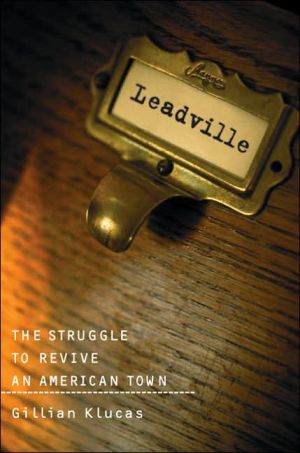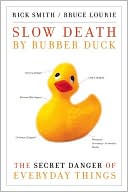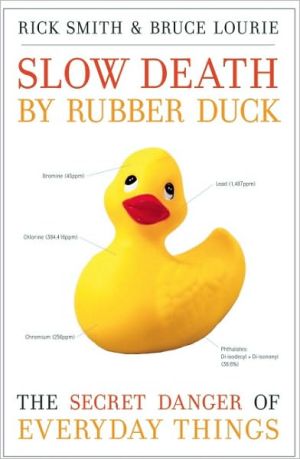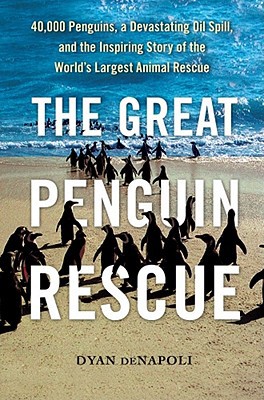Leadville: The Struggle to Revive an American Town
Leadville explores the clash between a small mining town high up in Colorado's Rocky Mountains and the federal government, determined to clean up the toxic mess left from a hundred years of mining.\ Set amidst the historic streets and buildings reflecting the town's past glory as one of the richest nineteenth-century mining districts in North America-a history populated with characters such as Meyer Guggenheim and the Titanic's unsinkable Molly Brown--the Leadville Gillian Klucas portrays...
Search in google:
Klucas, a journalist, became so interested in the plight of Leadville, Colorado--a town that fought the EPA to preserve the mine-waste dumps that were poisoning its water--that she moved there. The story, she writes, "reached far beyond historic preservation or even environmental protection to a town struggling for nearly twenty years to retain a way of life--a mining identity--in the face of economic hardship and governmental intervention." Her chronicle of the Rocky Mountain town's struggles captures the social, economic, and political complexities that occur as the nation attempts to restore the environment from more than 100 years of extracting resources from the earth, often by intensely disruptive methods. Annotation ©2004 Book News, Inc., Portland, OR Publishers Weekly A place where the river ran red with dissolved heavy metals and children played on mountainous waste rock piles, the mining town of Leadville, Colo., was one of the most polluted locales in America. This excellent narrative chronicles the decades-long battle to clean up the town and to redefine it after the collapse of the mining industry. Journalist Klucas, who now lives in Leadville, delves into the shifting motives and strategies of a surprisingly complicated cast of characters, including the determined but often high-handed Environmental Protection Agency; the large corporations and small landowners who wrangled in court over liability for the clean-up costs; the townspeople, some of whom opposed the federally imposed cleanup as an insult to the Superfund site they proudly called home; and the preservationists who defined the town's slag heaps as a legacy and tourist attraction with which to reinvent the place as a frontier mining theme park. Klucas accomplishes the almost impossible task of making thickets of environmental science, politics and litigation come alive, offering both a pointed critique of a badly drafted Superfund law-which some feel encourages lawsuits more than cleanups-and insights into other approaches. With evenhanded sympathy for all parties as they groped their way forward from intransigence to cooperation, she presents a fascinating inside look at one of the most heated environmental issues of the day. (Nov.) Copyright 2004 Reed Business Information.
\ Publishers WeeklyA place where the river ran red with dissolved heavy metals and children played on mountainous waste rock piles, the mining town of Leadville, Colo., was one of the most polluted locales in America. This excellent narrative chronicles the decades-long battle to clean up the town and to redefine it after the collapse of the mining industry. Journalist Klucas, who now lives in Leadville, delves into the shifting motives and strategies of a surprisingly complicated cast of characters, including the determined but often high-handed Environmental Protection Agency; the large corporations and small landowners who wrangled in court over liability for the clean-up costs; the townspeople, some of whom opposed the federally imposed cleanup as an insult to the Superfund site they proudly called home; and the preservationists who defined the town's slag heaps as a legacy and tourist attraction with which to reinvent the place as a frontier mining theme park. Klucas accomplishes the almost impossible task of making thickets of environmental science, politics and litigation come alive, offering both a pointed critique of a badly drafted Superfund law-which some feel encourages lawsuits more than cleanups-and insights into other approaches. With evenhanded sympathy for all parties as they groped their way forward from intransigence to cooperation, she presents a fascinating inside look at one of the most heated environmental issues of the day. (Nov.) Copyright 2004 Reed Business Information.\ \ \ \ \ Kirkus ReviewsMagazine journalist Klucas debuts with a patiently detailed unfolding of the environmental missteps that have marked the entire history of Leadville, Colorado. The town sits atop an impressive array of mineral deposits: silver and gold, copper and manganese, molybdenite, and, of course, lead. This variety, explains Klucas, allowed Leadville to survive when other one-horse mining burgs went bust. During its heyday, the town hosted Oscar Wilde and Sarah Bernhardt at the opera, made a multimillionaire of Meyer Guggenheim, and generated enormous quantities of waste. Even during lean times, Leadville was a community tightly knit by friendship, camaraderie, and pride in its mining tradition. But tunnels often burped a gush of suspended metals into the Arkansas River, creating Technicolor hues. One spectacular belch coincided with the rise of environmental concern across the country, bringing the EPA, the CDC, and other federal agencies to Leadville's door and earning it a reputation as the Rockies' Poison Central. At this moment, the story gets really interesting, and the author's clarifying touch pays off. The defenders of the environment came on like gangbusters, alienating the citizenry to such an extent that they found the EPA more toxic than the tailings. Klucas shows that all concerned parties acted in their own worst interests: the regulators creating a stultifying bureaucracy, the mine operators treating the problem as a legal rather than an engineering issue, the Colorado attorney general filing an absurd class-action lawsuit. "Any law that invites this much litigation is poorly drafted," one judge commented, referring to the Superfund's severe liability provisions and generalclumsiness. "Why should you pass a law that is so complicated that everyone spends more on lawyers than they do on the technical side solving the problem?" Character sketches provide a refreshing break from all the legal squabbling and stalling; Klucas makes even the drab players as bright as the river. Meticulous almost to a fault, but flashing with human interest and keen environmental insight: an illuminating march through environmental politics at a turning point in green awareness.\ \








